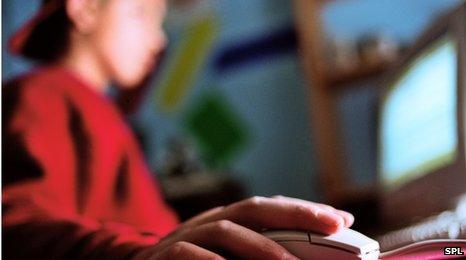Cyberbullying: Tips to stay safe online
- Published

Cyberbullying can affect any age group says the Beatbullying charity
Social media sites like Facebook are regularly being used to abuse teachers, says a survey.
Of the 1,500 teachers who responded, 42% reported things like insulting comments, allegations of inappropriate behaviour and having photos passed around the internet.
One 27-year-old teacher told Newsbeat how she fell into depression and had to go on medication because of the way she was targeted online.
The problem of cyberbullying can affect any group, says Richard Piggin, deputy chief executive of .
"It doesn't matter whether you're 13 or 30," he said. "The behaviour is still the same and the consequences are still the same.
"It can still hurt just as much and have an impact on confidence and if it takes place in school, your willingness to want to go to school."
Richard says there's a big gap between what many people think is acceptable online, compared with the real world.
He says cyberbullying often isn't taken as seriously as face-to-face bullying and that help can be hard to find.
"Sometime it's not taken down, sometimes the support networks aren't in place," he said.
"Schools are unclear and perhaps don't have guidance or the confidence to know what they can do and whether they can act."
He also reckons social networking sites should be quicker to take down cases of online bullying.
, a bullying support website, recommends the following:
Top tips
Don't post personal information online, like your address, your email address or mobile number. Keep personal information as general as possible.
Never let anyone have access to your passwords. Check the privacy settings on accounts like Facebook and make sure you know how to keep your personal information private.
Think very carefully before posting photos of yourself online. Once your picture is online, anyone can download it and share it or even change it.
Never respond or retaliate, as this can just make things worse. It might be difficult, but try to ignore the bullies.
Block any users that send you nasty messages.
Save and print out any bullying messages, posts, pictures or videos you receive or see.
Make a note of the dates and times of bullying messages, along with any details you have about the sender's ID and the URL.
Don't pass on cyberbullying videos or messages.
If you're being bullied repeatedly, think about changing your user ID, nickname or profile.
Don't ignore it. If you see cyberbullying going on, report it and offer your support.
Google yourself every now and again. It will show you what is online about you and what others can see and you can make changes if you don't like what you see.
- Published8 May 2012
- Published7 February 2012
- Published3 November 2011
- Published28 September 2011
- Published15 November 2010
- Published16 November 2009